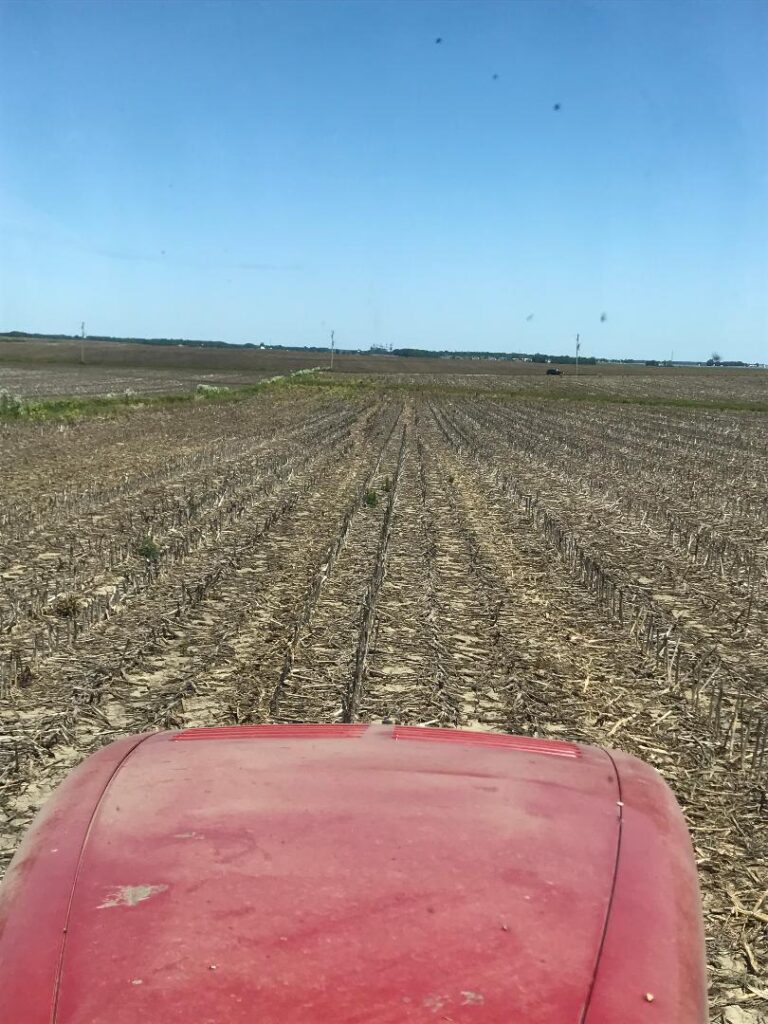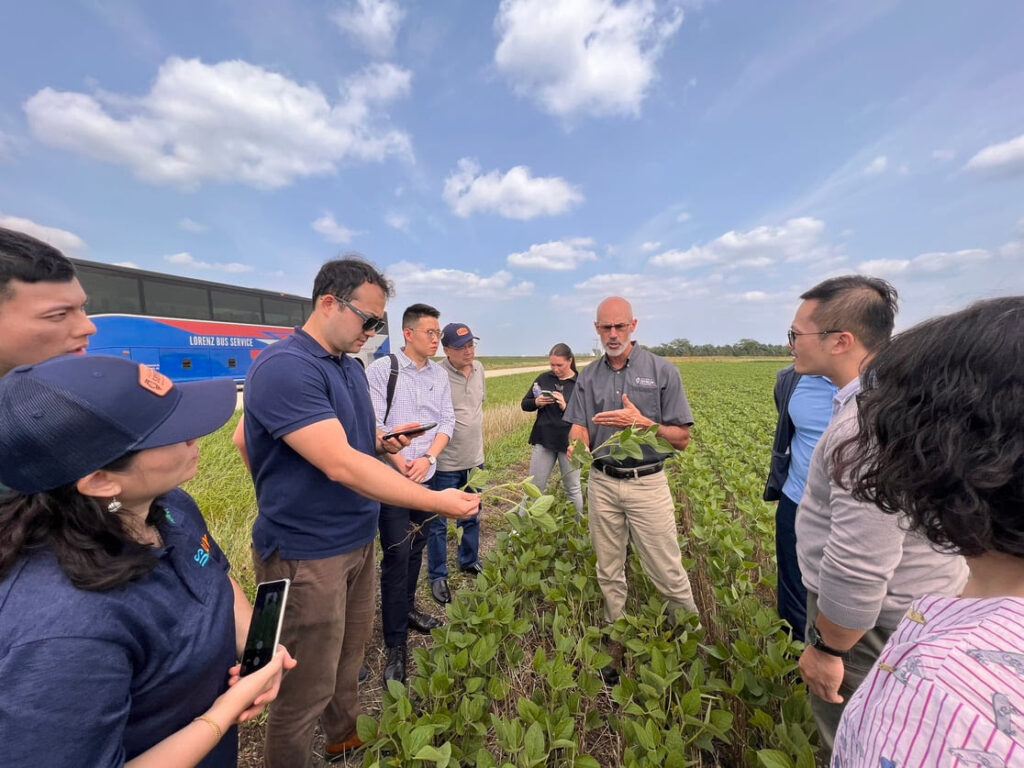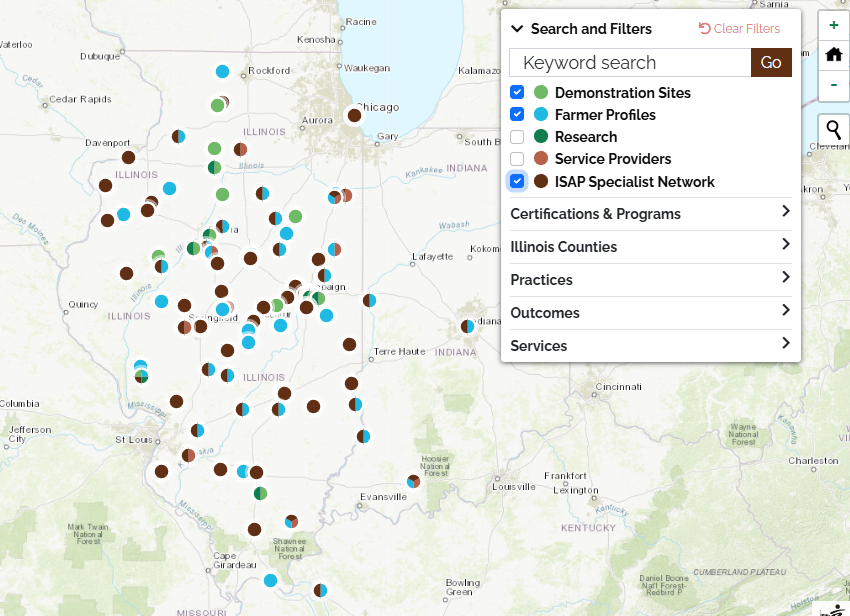On June 11, 2025 the Illinois Cover Crop On-Farm Network (ICCON) hosted a farmer panel discussion featuring Dan Kelley of McLean County, Ed Dubrick of Iroquois County, and Jeff O’Connor of Kankakee County. The purpose of this panel discussion was to learn about each farmer’s journey in conservation and to hear about their networks of support, such as other farmers and industry professionals, that have helped them over the years to be successful and committed to using conservation focused systems on their farms.
The panel represented the production diversity among Illinois crop producers. Dan and Jeff are both multigenerational corn/soybean farmers and in some instances are farming very different soils that present distinct challenges and opportunities. Ed, a first generation farmer, on the other hand, says he and his wife operate an “atypical Illinois farm” in that they do not produce corn and soybeans in the traditional row crop setting. With a background in ag retail, Ed raises produce crops and poultry in his market garden utilizing regenerative agriculture practices.

Ed Dubrick, first generation farmer, started his operation DuChick Ranch LLC in 2020. DuChick Ranch believes in regenerative agriculture and works to incorporate those principles and practices in their pastures and their crops.
Despite the variances in their operations, all three farmers emphasized the importance of seeking and having access to a network of resources to help guide them along the way. These networks have included fellow farmers, Soil and Water Conservation District (SWCD) contacts, and Natural Resources Conservation Service (NRCS) personnel, as well as organizations with larger scopes of networks such as the Illinois Stewardship Alliance, Illinois Ag Leadership Program, and the Global Farmer Network. The farmers shared that through the advancements of modern technology, their support networks have extended beyond in-person relationships. Ed and Dan both mentioned that they’ve been able find support through virtual means like Google searches and YouTube videos that offer valuable learnings for their operations.
Each farmer shared the importance of being able and willing to learn from others. Ed shared a valuable piece of wisdom given to him by his grandfather; “my grandpa used to tell me you won’t live long enough to make all your own mistakes. So, you better learn from other people’s.”
Dan Kelley shared numerous ways to find tangible resources, such as access to equipment or agronomic research, and mentioned that farmers should never hesitate to reach out to the agronomy departments at the local colleges and universities as a place to start. Those institutions are full of researchers and individuals who can help connect a farmer to other people and to information, shared Dan. Notably Dan highlighted, “It doesn’t cost a thing to have the conversation.” This is great advice not just in the context of speaking to educational institutions but also to fellow farmers.

Dan grows corn and soybeans in partnership with his brothers and son. Dan has a long history with agriculture cooperative systems and provides leadership to GROWMARK and CoBank.
Jeff shared an insightful thought that very much sums up what it means to be farming differently than the historical status quo; “Things aren’t going to look like the pictures in magazines. So I really had to transform how I viewed it and ignore the phrase ‘farmers are the best stewards of the land’, and transform that into ‘what level of stewardship am I willing to attain and live with things looking different?’”

On Jeff’s farm, he raises corn, soybeans, wheat and Non-GMO soybeans. Jeff routinely open the farm up to share the story of modern agriculture and regenerative ag practices.
The opportunity to hear from these farmers and their experiences serves as yet another source of information for farmers who are looking to make changes and improvements to their cropping systems. Each panelist emphasized the importance of connecting with others to support their conservation ag journeys. For folks who are looking to make changes or are on a continuation of their own journey, ISAP has developed the Conservation Story Map. ISAP’s Conservation Story Map is designed to communicate sustainable agriculture efforts in Illinois and facilitate connections to support healthy soil, clean water, and profitable farms. The map features demo sites, farmers, researchers, service providers, and conservation professionals for folks to connect with.

The Conservation Story Map allows users to filter results by selecting a combination of conservation practices, outcomes, and ag services to find folks across the state to connect with.
The panel discussion can be viewed on ISAP’s YouTube channel. ICCON will meet again on July 9 at 9AM CST to learn about how ag advisors play a key role in advancing conservation practices on the ground. Register today and join us! If you are interested in joining the Illinois Cover Crop On-Farm Network to learn about new research and hear from cover crop specialists across the Midwest, please join our google group by sending an email to hello@ilsustainableag.org.